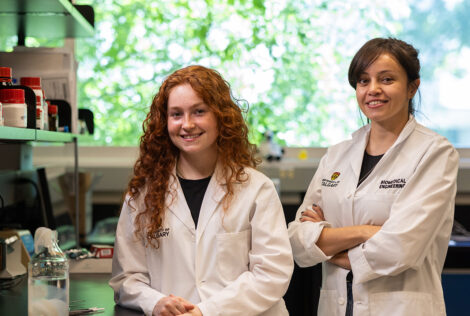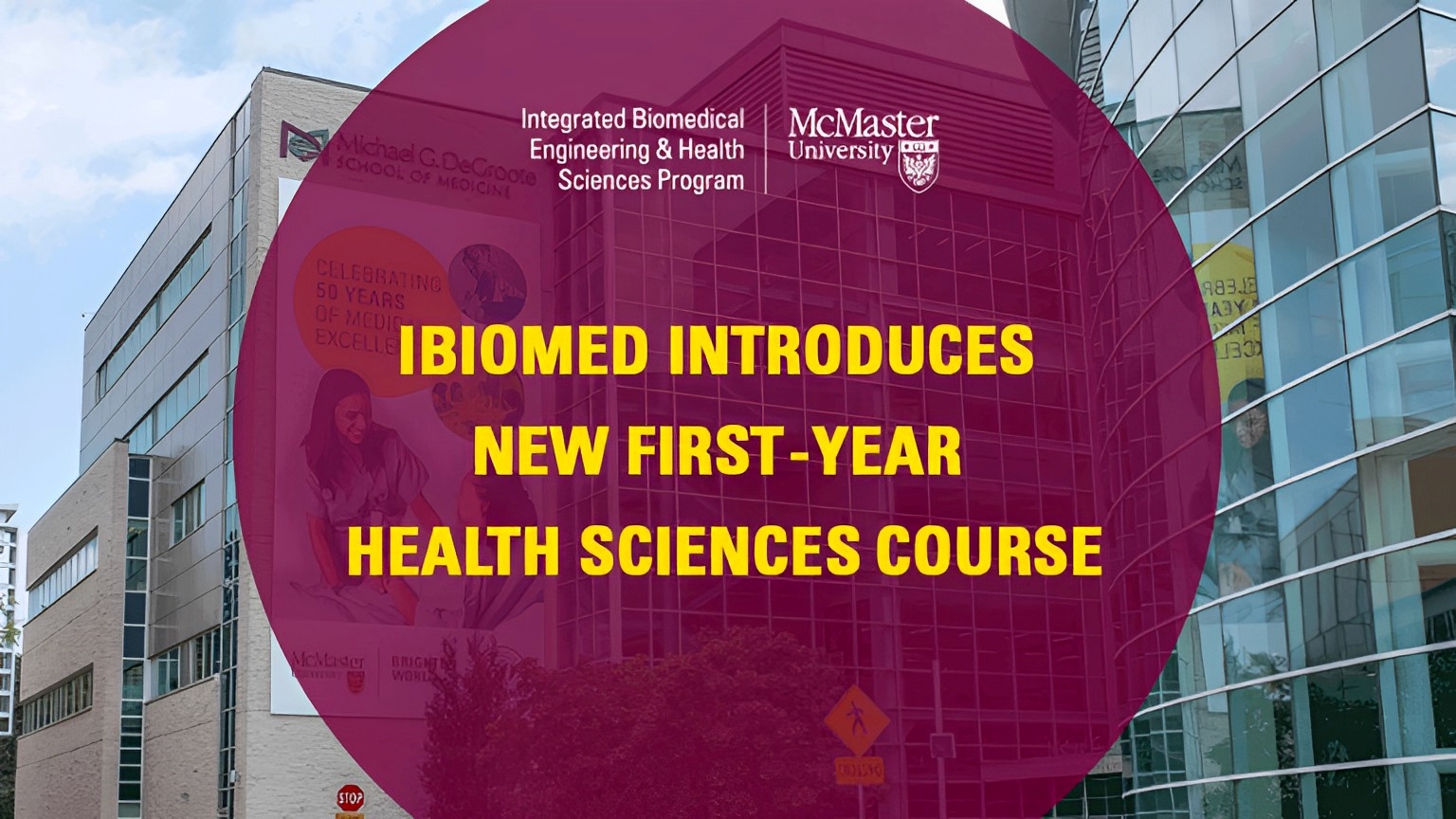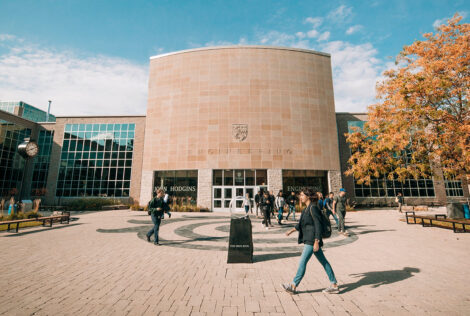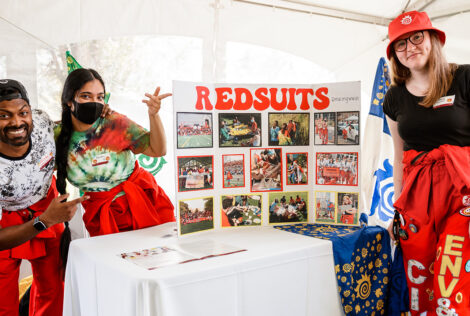

How does our understanding of the microscopic world of biology contribute to the creation of innovative biomedical solutions, and what does cellular biology have to do with terms like entrepreneurship and innovation? Students will discover this and more in IBEHS 1EP6.
The iBioMed program is excited to introduce a new first year health sciences course, IBEHS 1EP6 Entrepreneurship in Biomedical Innovation: From Bench to Market. This course uses project-based learning to explore the latest in biomedical research, technology and innovation and pushes students to create pragmatic solutions to important healthcare problems.
Students work in small teams to study specific human diseases, from diabetes to Alzheimer’s, and consider these diseases from a biological, clinical and socioeconomic perspective. By taking an interdisciplinary approach, students come out of the course with an appreciation of the ‘big picture’ and the important considerations when looking to go from idea to impact. Working closely in these small teams is also a great way to make friends!
This new course will be taught by Dr. Anna Korol, Assistant Professor, Department of Medicine, Division of Innovation and Education and Dr. Julian Yabut.
What will students enjoy most about IBEHS 1EP6?
Natasha Verhoeff (IBEHS 1EP6 Teaching Assistant, Level IV, Child Health Specialization, Bachelor of Health Sciences):
This course has a variety of unique features that I think students will really enjoy. Firstly, a large part of IBEHS 1EP6 involves students collaborating in groups with their peers. This provides them with an opportunity to enhance their peer collaboration skills and build meaningful relationships with each other. This course’s emphasis on group work combined with its interdisciplinary nature also helps students learn from a diverse array of perspectives and take a holistic approach to problem solving.
Lastly, the course assessments are more exciting, engaging, and rewarding than typical tests and exams. Rather than simply requiring students to memorize and recall information, the assessments in IBEHS 1EP6 provide an opportunity for students to build a diverse array of skills that will help them succeed not only in future courses, but also beyond in whatever career path they pursue. Examples of the skills this course helps build include personal awareness through reflection writing, peer evaluation through completing group evaluations, professional communication through giving presentations, and problem solving, critical thinking, creativity, and innovation through researching and writing weekly meeting minutes with the end goal of proposing impactful solutions to real-world health challenges.
What kinds of projects can students expect to work on?
Daniel D’Souza (IBEHS 1EP6 Teaching Assistant, Level IV, HESE, iBioMed):
Each project will center around a current and relevant disease, such as COVID-19, diabetes, or neurodegenerative disorders. For each project, the major task is three-fold:
- Understand the normal pathways through which cells and molecules interact with each other and behave to give rise to a healthy individual
- Understand what goes wrong in these pathways which ultimately culminates in disease
- Use (1) and (2) to propose a solution and market it to potential investors. In each of these 3 tasks, students will immerse themselves in the scientific literature and use their findings to bolster their understanding and/or support their solutions.
Within each project, you will also be given the opportunity to explore the economic and social implications of disease (which are so critical to the way healthcare is distributed). Keep in mind that there is no one right solution to be proposed. The problems are often multifactorial and open-ended, and it is part of the challenge to pick one small problem out of the bigger problem. Like in real life, the idea is that by tackling one aspect of a bigger problem, your findings may trigger others to further the research. That’s what the world of science really comes down to – it’s cumulative!
What are some of the key learning outcomes / objectives?
Lubna Najm (IBEHS 1EP6 Teaching Assistant, Level V, HESE, iBioMed):
The main objective of this course is self-guided learning and discovery through project-based and inquiry-style classes. Unlike a traditional course, students are encouraged to pursue their own interests and have an active part in their own educational experience. By researching and exploring the literature, the students develop their knowledge with the latest or most updated scientific discoveries.
Other than knowledge in the field of cell biology, students will also gain interpersonal skills that can be applied outside of class, such is in a job, extracurricular or personal project. The students will learn problem solving, time management, and organization skills by breaking down a large 1-month project into small milestones and meeting minutes.
As well, being in teams, they will gain skills in communication, leadership and collaboration, which will help them in future courses and career paths, where teamwork is essential. The projects that students work on are purposely left open-ended, giving the students opportunities to be creative and adventurous in what they explore as well as present in their final deliverables.
In the end, we want students to enjoy what they are learning and use those skills and knowledge for their educational requirements, but also in their own personal experiences outside of the course.
Any tips for students on how to succeed in this course?
Varun Jain (IBEHS 1EP6 Teaching Assistant, Level IV, HESE, iBioMed):
Keep an open mind throughout the course, especially when collaborating with your group. Immediately after your first lecture, you will learn that this course is nothing like your conventional cellular and molecular biology course. This course adopts a problem-based learning approach where students create their own learning. Although this may seem rather uncomfortable, keep an open mind and allow for your motivation and interests to drive your learning.
Ensure that you and your team maintain constant, but effective communication throughout your investigations. With group projects, communication is often a limiting factor in overall progress and innovation. Ensure that everyone is on the same page throughout, especially when it comes to expectations, assigned tasks, and most importantly the direction of the project.
How will this course prepare students for upper-year courses?
Zachary DeMelo (IBEHS 1EP6 Teaching Assistant, Level V, Software and BME, iBioMed):
This course will allow students to develop and sharpen their critical reading skills as they explore a wide range of scientific literature, to address and creatively solve a variety of open-ended problems. This will prepare students for future research projects as they develop skills in literature analysis, experimental design, methods and metrics. They will gain experience working in teams, working to develop their communication, collaboration and leadership skills.
John Milkovich (IBEHS 1EP6 Teaching Assistant, Level IV, HESE, iBioMed):
Not only does this course provide a solid foundation for understanding what happens at the cellular level, but it takes it one step further by providing insight in what it takes to scale a research project from bench to market. As an upper year HESE student, I can say that this course effectively integrates cellular and molecular biology with entrepreneurship overtones. Students will develop the ability to be innovative and collaborate with their peers to develop a solution for a pathology (I.e., neurodegenerative diseases) while analyzing and presenting the value of their solution in its given market as if they were pitching to investors. This skillset and experience are conducive to upper-year courses as well as careers in biomedical research, development, and innovation.
Want to know more? Check out a featured 1EP6 project, A-Eye Care, presented by our Level 1 students at the 2021 iBioMed Showcase.


